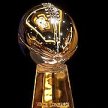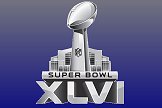
| The Complete Super Bowl |
| Established April 1, 1999 • A Division of Hoffco, Inc. • Not endorsed by the NFL |
| Games • MVPs • Standings • Records • Rings • Programs • Pre-Super Bowl • Sitemap • About |


|
|  |
Size Disadvantage Stymies Broncos Again
For the fourth consecutive year, the Super Bowl resulted in a killing of the AFC by the NFC. For the second year in a row, the victim was Denver. The consensus opinion was that Washington, a good big team had proven superior to a fair small team with one great player--Denver's John Elway.
In spite of the 42-10 score, Super Bowl XXII had its share of moments, including the biggest single-quarter offensive explosion in Super Bowl history. The most plublicized element in the two weeks prior to the game was that of Washington's Doug Williams being the first black quarterback to start in a Super Bowl and the inevitable comparisons of his abilities and those of Elway.
Largely because of the perceived advantage the Broncos had with Elway, Denver entered the game as a 3 1/2 point favorite. Williams, who gained the Redskins' starting job only at the end of the regular season, handled the pregame media blitz with grace, even when fielding such inane questions such as, "How long have you been a black quarterback?"
The Broncos broke on top when Elway hit wide receiver Ricky Nattiel with a 56-yard touchdown bomb after only 1:57 into the first quarter. Elway looked off Redskin cornerback Barry Wilburn until the last second before turning to Nattiel. On Denver's next possession, a trick pass--Steve Sewell to Elway-- landed the Broncos close to the Washington goalline before settling for Rich Karlis' 24-yard field goal.
Meanwhile, Washington seemed unable to muster a consistent offense. Near the end of the quarter, Williams slipped on the turf and twisted his knee, forcing him to leave the field for a play.
The Redskins entered the second quarter trailing 10-0 and with a limping quarterback. They proceeded to put together the most remarkable 15 minutes in Super Bowl history. First, Williams hit Ricky Sanders for an 80-yard TD, tying the Super Bowl record for the longest reception. They play, which many regarded as the turning point, was designed to go short, but when Sanders was bumped at the line of scrimmage, he adjusted by going long. Next, Williams threw to Gary Clark for 27 yards to put the 'Skins in front 14-10. Moments later, rookie running back Timmy Smith broke away for 58 yards on a counter play to widen the lead. The next possession saw the Williams-to-Sanders combination click for a 50-yard TD. Tight end Clint Didier scored the Redskins' fifth touchdown with 1:04 left in the period on an eight-yard toss from Williams.
The Redskins' 35 points in one quarter was a record for a postseason game. They totaled 356 yards on only 18 plays. Individual marks for the quarter included Smith's 122 rushing yards (on 5 carries), Sanders' 168 receiving yards (on 5 catches), and Williams' 228 passing yards (9-of-11 completions). His four TD passes set a record for one quarter and tied the Super Bowl record for a game.
The second half was anticlimactic. The Redskins kept mainly to the ground. Smith, who was not told he would start until shortly before game time, scored the only touchdown of the second half on a 4-yard run at 1:51 of the the fourth quarter. For the game, Smith broke Marcus Allen's Super Bowl record with 204 yards on 22 carries. Other Super Bowl records were broken by Williams (340 passing yards), Sanders (193 receiving yards), and kicker Ali Haji-Sheikh (six extra points). The Redskins' 602 net yards was also a record.
Meanwhile, Denver was held completely in check. With Elway forced to pass on most plays in a futile attempt to catch up, the Redskins sacked him five times. He completed only 14-of-38 attempts for 257 yards and had three intercepted--two by Wilburn. Williams, who completed 18-of-29, was chosen as the game's Most Valuable Player, certainly the most effective answer to those who questioned the ability of a black quarterback to win a Super Bowl.